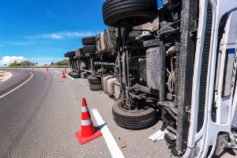
Brakes are a critical component of any vehicle. If they fail, serious or fatal truck accidents may occur.
Now picture one of the largest and heaviest vehicles on the road – an 18-wheeler – and imagine that its brakes are defective or poorly maintained. The damage that this vehicle inflicts if it cannot stop in enough time to avoid a collision is devastating. According to the Federal Motor Carrier Safety Administration (FMCSA), 29% of large truck crashes studied over a three-year period involved brake issues.
What Causes 18-Wheeler Brakes to Fail?
There is never a good time for a truck’s brakes to fail. When they do and cause collisions with other motorists, they cause severe injuries, massive property damage, and may even be fatal. But what causes 18-wheeler brakes to fail?
To bring these massive vehicles to a halt, sophisticated air brake systems are a necessity. These extremely complicated braking assemblies require specialized parts and technicians who understand the inner workings of commercial trucks to maintain them. If regular maintenance is not performed, or if one of the many parts or devices involved is defective, catastrophic brake failure may occur.
Some of the most common truck brake problems include:
- Brake systems out of adjustment
- Imbalanced brake systems
- Defective components or devices
- Worn components
- Overheated brake systems
- Absence of automatic slack adjusters
- Poor air pressure or air pressure signal issues
- Defective or broken ABS indicators
These issues may not be addressed immediately due to inadequate or poorly timed brake system inspection and maintenance. Trucking companies have a responsibility to address these issues to maintain safe vehicles and avoid crashes.
Who Is Responsible When a Truck’s Brakes Fail?
When an 18-wheeler’s brakes fail and a collision occurs, it is important to determine who may be held liable for the injuries and property damage that result from the crash. In the event of brake malfunction or failure, there are several different parties who may shoulder all or some of the responsibility. These include:
- The truck driver
- The trucking company or owner of the rig
- The mechanic or shop that performed maintenance or repairs
- The manufacturer of the brake parts and systems
According to the Federal Motor Carrier Safety Regulations (“FMCSRs”), motor carriers must inspect, maintain, and repair all vehicles in their fleet on a routine schedule. They are also responsible for making sure that all parts and accessories are in “safe and proper operating condition at all times.”
The failure of trucking companies, maintenance contractors, and other responsible parties to make sure that their vehicles’ brake systems are inspected and maintained results in otherwise preventable accidents. When companies put delivery deadlines and profits over the safety of other motorists, they can and should be held accountable for their carelessness and negligence.
Contact a Longview 18-Wheeler Accident Lawyer
If you were hurt in a collision with an 18-wheeler that had faulty brakes, you might be entitled to seek compensation for your losses. The experienced truck accident attorneys of The Sloan Firm have the knowledge and resources needed to thoroughly investigate your accident and determine who should be held responsible for what happened to you.
Don’t let the trucking company or others get away with careless and harmful practices. We are ready to help you pursue the justice and compensation that you are owed. Contact us by phone or online to schedule a consultation with us today. There is no fee unless we win your case.
